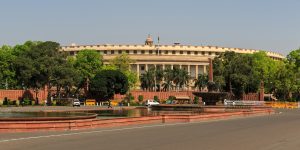Major Indian opposition parties boycotted the opening day of Parliament’s budget session on Friday in solidarity with protesting farmers engaged in a 2-month standoff over new agricultural laws the government refuses to repeal.
The protests were marked by violence on January 26, India’s Republic Day, when tens of thousands of farmers riding tractors and on foot stormed the 17th century Red Fort in a brief but shocking takeover shown live on news channels. Clashes between the protesters and government forces left one protester dead and nearly 400 police officers injured.
India’s ceremonial President Ram Nath Kovind listed the government’s priorities in an address to Parliament. The budget is to be presented on Monday.
He described the violence as “unfortunate” and said people in a democracy are expected to respect the rule of law.
A statement by the main opposition Congress party said 16 opposition parties boycotted the president’s address to Parliament “in full solidarity with the agitating farmers, whom the Modi government is trying to defame.”
Modi’s party has 302 seats in the 545-member Lok Sabha, the more powerful lower house of Parliament that elects the prime minister and runs the government, and has 93 of the 245 seats in the upper house, or Rajya Sabha. The boycotting parties have about 150 members in the lower house and 125 in the upper house.
After the violence, three smaller groups among more than 40 farmers’ organizations disassociated themselves from the protest. Police said they have arrested 19 protesters and detained 50 others for questioning under strict sedition and other laws, and leaders of the farmers were being sought for questioning.
People living near the farmers’ campsites on the outskirts of New Delhi also are demanding the farmers leave the area due to disruptions to their businesses and lives.
On January 29, about 300 people hurled stones at farmers camping in the Singhu area and uprooted some tents. They shouted slogans asking the farmers to go home. Police used tear gas to disperse them.
Traffic crawled on the outskirts of the Indian capital the same day as authorities rushed hundreds of riot police to three of the campsites hoping to convince the farmers to go home.
They have vowed to stay until the laws are repealed, but talks with the government have been unsuccessful.
The protests are the biggest challenge to Prime Minister Narendra Modi since he came to power in 2014. He says the new laws are necessary to modernize Indian farming.
The farmers say the new laws will turn agriculture corporate and leave them behind.
By Ashok Sharma for the Associated Press in New Delhi, India.
































